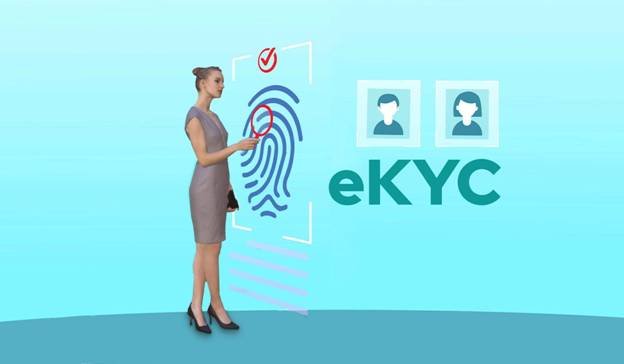In today’s digital age, the finance and banking industry constantly seeks innovative solutions to enhance customer convenience while ensuring security and compliance. The concept of e-KYC, which stands for Electronic Know Your Customer, is a game-changing development in this regard. This article delves into the e-KYC full form meaning and its pivotal role in simplifying digital verification processes, while also shedding light on related aspects such as the implications of personal loan default.
Understanding E-KYC: The Full Form and Meaning
E-KYC stands for Electronic Know Your Customer. The e kyc full form highlights the paperless electronic process of verifying the identity of individuals and businesses during the onboarding process of financial services. The e-KYC process leverages technology to eliminate the need for physical document submission and in-person verification, making it a crucial component of the digital transformation in banking and financial services.
How E-KYC Works
The e-KYC process typically involves several technology-driven steps:
- Online Data Collection: Customers provide their personal details online through secure portals or apps. This includes uploading scanned copies of documents like Aadhar, PAN card, or passport, which serve as identity and address proof.
2. Biometric Verification: Many e-KYC procedures incorporate biometric data, such as fingerprints or facial recognition, to further verify the identity of the individual. This adds a layer of security and ensures the authenticity of the user.
3. Cross-Verification with Centralized Databases: The provided data is electronically cross-verified with government or centralized databases to ensure accuracy and authenticity. This minimizes errors and fraudulent activities.
4. Automated Approval: Once the data is verified, the system automatically approves the KYC process, completing in minutes what traditionally could take days.
Benefits of E-KYC
The shift from traditional KYC to e-KYC has brought about numerous advantages:
– Efficiency and Speed: The digital nature of e-KYC eliminates the delays associated with physical document submission, leading to faster processing times for customer onboarding.
– Cost-Effective: By reducing the reliance on physical branches and paper-based processes, financial institutions save significant costs in terms of manpower and administrative expenses.
– Enhanced Security: The use of biometric verification and real-time cross-referencing with national databases reduces the risk of identity theft and fraud.
– Convenience for Customers: Customers benefit from the ease of completing verification from the comfort of their homes without the need to visit a bank branch.
Role of E-KYC in the Financial Sector
The implementation of e-KYC in the financial sector has significantly streamlined processes and fortified compliance. Here’s how e-KYC plays a vital role:
1. Digital Banking and Payments
E-KYC is the backbone of digital banking services, allowing seamless account opening and management without physical interactions. It supports the burgeoning digital payments ecosystem, ensuring that financial transactions are conducted securely and efficiently.
2. Personal Loans and E-KYC
The e-KYC process is equally transformative in the context of personal loans. Lenders can swiftly approve personal loan applications by verifying borrower details digitally. This not only expedites disbursement but also reduces the chances of personal loan default by ensuring rigorous screening of applicants.
3. Regulatory Compliance
With stringent KYC regulations mandated by authorities globally, e-KYC assists financial institutions in adhering to these norms efficiently. The digital trail created by e-KYC processes helps in auditing and compliance checks, mitigating risks associated with money laundering and fraud.
Addressing Personal Loan Default through Robust Verification
Personal loan default is a significant concern for lenders. Traditional verification processes often failed to identify risky borrowers, leading to defaults. E-KYC can play a crucial role in mitigating this issue by:
– Comprehensive Risk Assessment: E-KYC systems can integrate credit scoring and risk assessment tools to evaluate the financial history and creditworthiness of applicants comprehensively.
– Timely and Accurate Data: The real-time data verification helps in cross-checking applicant information quickly, ensuring that borrowers who are prone to default are identified early.
– Fraud Prevention: With advanced biometric and data cross-verification, e-KYC minimizes the chances of fraudulent applications, protecting the lender’s interest.
Challenges and Future of E-KYC
While e-KYC offers multiple benefits, challenges remain in its widespread adoption. Privacy concerns and data security are at the forefront, requiring robust encryption and data protection measures. Moreover, ensuring accessibility for individuals who lack the necessary digital literacy or access to technology remains a challenge.
Looking forward, technologies like artificial intelligence and blockchain could further enhance the efficiency and security of e-KYC processes. As regulatory environments continue to evolve, e-KYC systems will need to adapt to maintain compliance and optimize verification processes.
Conclusion
In conclusion, the e-KYC full form meaning extends beyond mere semantics; it encapsulates a transformative shift in how financial institutions verify and on-board customers. By embracing technologies that ensure efficiency, security, and compliance, e-KYC stands as a cornerstone of modern banking solutions, addressing key challenges such as personal loan default. As we continue to navigate the digital era, the role of e-KYC in simplifying digital verification will only become more critical, shaping a secure and seamless financial landscape for all stakeholders involved.
